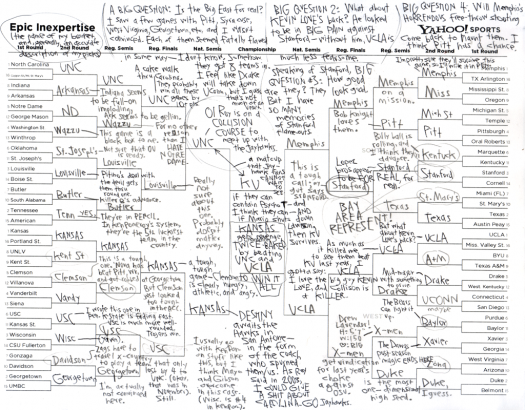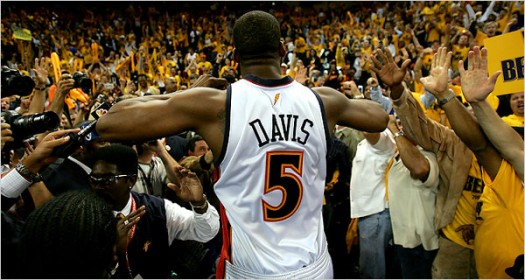Via Burritophile, an awesome resource for all things burrito.
Surreal. That's the word that keeps coming to mind. Kansas trailed by nine points with two minutes left, and yet somehow managed to win. Chalmers's shot. Collins's steal. Roy Williams — "Benedict Williams" to many Jayhawk fans — wearing a Jayhawk sticker. Is it possible that all of that *really* happened? Watch the last few minutes of the game again, and you'll begin to see how many little things went KU's way. There were big things, of course — Calipari's lack of faith in his bench, Joey Dorsey's fouls, CDR's clankers from the line — but there were also those momentary mistakes that add up: a terrible transition decision by Memphis, questionable judgment when Calipari doesn't call timeout after a made free throw to ensure that his team fouls, and the simple bad luck of Derrick Rose's first free throw that hit every part of the rim and then bounced out with 10 seconds left.Still, Kansas needed a miracle to simply pull even.

Photo: Streeter Lecka
Luke Winn of Sports Illustrated really nails the last few seconds in his Tourney Blog: "The ball took what Collins said seemed 'like five seconds' in the air, perfectly rotating, and Brandon Rush, who had positioned himself near the basket in the event of a tip, looked up at the net and 'saw it splash right in there.' … 'It will probably be,' said Self, 'the biggest shot ever made in Kansas history.'"
The bench reacts to Mario's shot. Photo: Jeff Haynes
The Kansas City Star's Jason Whitlock commented on the stories behind the story: "That's how you win it all, exorcise the demons and baptize a new era of greatness. You do it with an unforgettable rally, a stunning three-pointer and with your most famous and infamous coaching alum sitting in the stadium, cheering you on and sporting a Jayhawk sticker."
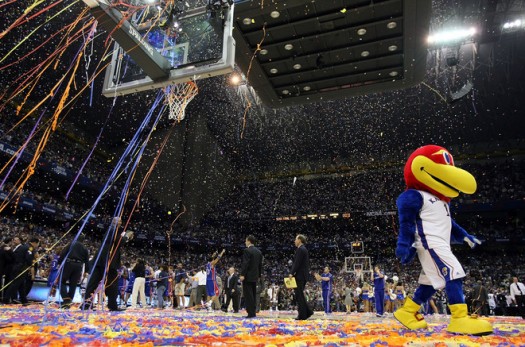
Photo: Jed Jacobsohn
The Star's Joe Posnanski on Memphis's seemingly insurmountable lead, and Mario's shot: "When you're young, you live in the moment. That's how it's supposed to be. Chalmers was not feeling the pressure of history when he fired the shot. He never could have made it then. Kansas was trailing by nine points with barely 2 minutes left. Memphis had taken all the intensity and will and ferocity that Kansas had to give, and then the Tigers pulled away. Up nine with about 2 minutes left? Over."
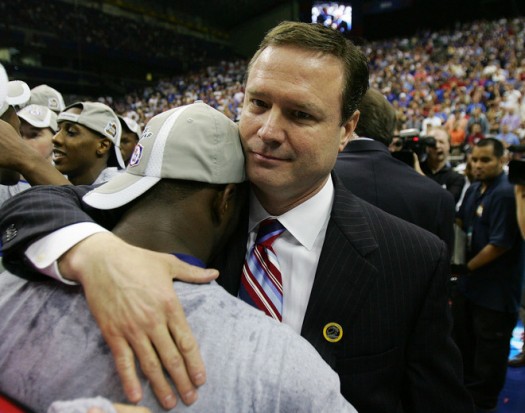
Sherron & Bill Self. Photo: Streeter Lecka
Collins's contribution was huge, despite his turnovers. He was in Derrick Rose's face all night, and his pace and fearlessness created the two biggest moments of the game — the steal with just under a minute left, and the pass to Mario with 5 seconds left. Dana O'Neil's article on ESPN really captures it well (title: "Without Collins, there is no Chalmers."). Derrick Rose commented on Sherron's play during Memphis's post-game press conference: "He did what he supposed to do as a point guard — control the team, push the ball up the court and make tough plays at the end. He just controlled the game.â€Self was characteristically modest after the game, "The outside public may view people that win a championship differently, but coaches know you don't get smarter because a hard shot goes in or doesn't go in. I'm proud of our guys, happy for everybody involved, but I don't see it that way.â€I'm not sure what it will take for the talking heads to give him some respect, honestly. In ESPN's pre-game show, the former coaches (Vitale, Digger, and Knight) lavished praise on Memphis coach John Calipari. Vitale threw around all the usual hyperbole ("genius," "innovator," as I recall), and even Knight complimented Cal's inventiveness as a coach. After the game, the mood was funereal around the ESPN desk, as if they themselves had lost the game. Why? There are some compelling conspiracy theories bouncing around the comments on the Lawrence Journal-World site, e.g. "[Supporting] Kansas promotes [KU's] recruiting and keeps Kansas a Cadillac program. In turn, that steers recruits away from schools where the talking heads have loyalties and relationships with coaches that give them the access they require in the major media markets they need to pump up their Q ratings and market share ratings." Hmm.Finally, the NYT's Pete Thamel posted some engaging commentary on The Quad, the NYT's college sports blog. He describes the scene in the Memphis locker room afterward:
There are only two locker rooms I'd ever seen where the players were this devastated. One was the U.S.C. locker room after Matt Leinart and the Trojans lost the national title to Texas in the Rose Bowl. I remember Leinart sitting alone on a bench, eating a turkey sandwich and a chocolate chip cookie and drinking a Gatorade. It was kind of surreal that his whole senior year had come down to that.The other was the Oklahoma locker room after the Sooners lost to Boise State in what many consider the greatest finish to a college football game. That would be the Ian Johnson, Statue of Liberty, hook-and-ladder game. The most bizarre scene from that locker room was Oklahoma Coach Bob Stoops just standing by himself, staring off into the ether. It's rare to see a head coach alone anywhere, anytime. But Stoops could have been on Pluto, and no one at that second was going to visit.
Finally, today's Kansas City Star front page. Nice! I had the 1988 version on my bedroom wall for about 10 years, until it basically turned into dust.
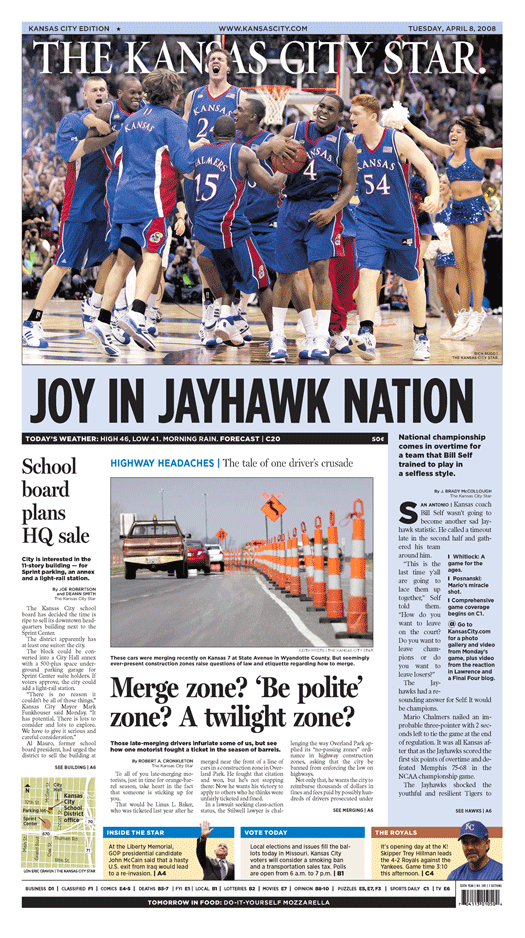
If words are windows to the soul, this blog has become a massive vista onto my sports obsessions and, specifically, Kansas basketball. Soon enough it'll all be over, the fever dream will end, the sun will rise, and I'll be back to the old stuff. Until then, I want to post one more thing, to commemorate the Jayhawks' run to San Antonio.
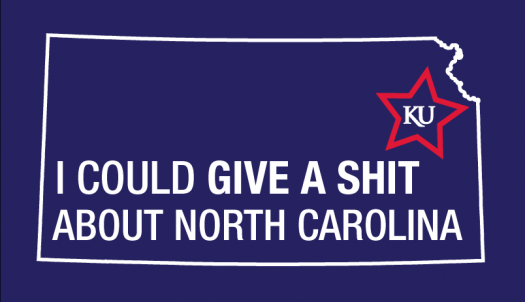 I designed a t‑shirt that expressed my feelings with regard to the Heels, which — in a really weird coincidence — echo Ol Roy's sentiments c. 2003.
I designed a t‑shirt that expressed my feelings with regard to the Heels, which — in a really weird coincidence — echo Ol Roy's sentiments c. 2003.
For many Kansas fans, Roy's angry words ring true — truer, even — today. Sure, Roy may have claimed to have "given a shit" at that moment, but he changed his tune a week later. Jayhawk fans probably still couldn't give a shit, to say the least. Now, we can declare this to the world. [Buy it now now now from Zazzle].
A day that will live in infamy
In case anyone's wondering what the heck the shirt is all about, let's take a quick trip down YouTube lane. The year was 2003; the time was 10 minutes after KU's national final loss to Syracuse; the place was the tunnel outside the Kansas locker room The "shit" part clearly wasn't pre-meditated, yet it was perfectly timed, putting a bitter exclamation point on a ringing rebuke. Of course, the most shocking part of it all was that it came from the man who had — to that point — cornered the market in "dadgums" and "doggones:" Ol Roy, the kind country cousin of college basketball. In more ways than one, that interview was the end of an era, and in retrospect, Roy's aw-shucks-ing and dadgum-ing seems a little silly, but it sure worked well for a while. Now, well. Times have changed.
Despite being stocked with recruiting riches, Duke is going home early and it's not too surprising why: streaky offense, untimely turnovers, killed on the boards, nothing in the post, the list goes on. But what's different about this team? Why isn't Coach K's formula working anymore?
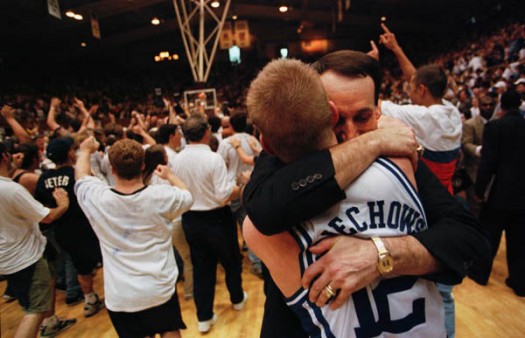 "Promise me you'll never leave." Photo: Replay photos.
"Promise me you'll never leave." Photo: Replay photos.Coach K has always recruited players with radically inverted ratios of talent to likeability — incredibly gifted, fundamentally sound players who always come across as arrogant and entitled. His players are not only good athletes, they're (generally) clean-cut, team-oriented guys who care more about winning than stats, and usually, come March, they're mowing teams down with a single-minded drive to the Final Four.At least part of the problem seems to be that this particular model (coaches and players alike) just isn't built for, nor is it capable of adapting to, the kinds of competition it sees in the tournament. Davidson doesn't have a reliable post presence, and they're still around because (a) they've got a guy who can light it up, and (b) they had other guys who leapt into the breach when that guy wasn't getting it done. With Duke, it's partially a function of the players just not getting it done, but it also seems like the coaching staff isn't addressing at least one fairly obvious problem.
Someone needs to tell him the truth
Who is going to tell Coach K that point guard Greg Paulus is killing the team with terrible transition decisions, ill-advised threes and really bad defensive gambles? Not Wojo. After all, he *was* Paulus eight years ago. Not Chris Collins. He was Paulus ten years ago. When you include Quin Snyder, Tommy Amaker, Jeff Capel, and the unattainable model — Bobby Hurley — in the conversation, it becomes clear that Coach K has basically recruited the same guy again and again. Or perhaps he has just always been trying to recruit Bobby Hurley. Unfortunately for Duke, Paulus is no Bobby Hurley. He's not even close.Maybe you can be the next one; here's a DVD called Mike Krzyzewski: Duke Basketball — Developmental Drills for Point Guards.
Fellow Duke haters, our cup runneth over
When Duke is struggling, there's a disturbance in the Force across college basketball universe, and it ripples through the sporting press. On Sunday, The New York Times — which generally reserves its biased reporting to Democatic politics, the local teams and the Big East — published an fairly obviously gloating analysis of Duke's loss on Sunday. Most sports journalists would ignore — or even criticize — the posturing of players during post-game press conference, but this article uses post-game trash talk as the platform for game analysis.
When told that the Mountaineers had just beaten a team with eight McDonald's all-Americans, Alexander seemed startled. He arched his eyebrows and asked in a serious tone, "Who?"Nearly every Blue Devil who played Saturday was a high school all-American. West Virginia has none. So after embarrassing the Blue Devils on the court by scoring 22 points in a 73–67 victory, Alexander and his underrecruited and underhyped teammates spent much of the postgame interviews in the locker room mocking the Duke mystique.
There are at least two things really wrong with these paragraphs. First of all, Joe Alexander knows who Duke's All-Americans are. They probably whooped his butt in AAU games and took all the big prizes on the summer camp circuit. (I stand corrected. Apparently, Alexander grew up in Asia). By beating Duke in the tournament, Alexander earned some recognition — good for him — but why spend it on schoolyard taunts? Secondly, West Virginia in no way "embarrassed" Duke. The game was tight, both teams battled. An embarrassment could take many forms, but this game wasn't one.
For the second consecutive year, the Blue Devils found out that their blue-blood history, recruiting pedigree and ESPN-fueled aura mean little in the N.C.A.A. tournament.
I highly doubt that Duke's seeming nightly presence on ESPN has done anything to make other teams fear them. If anything, it makes them a bigger target, and it gave everyone in the country a chance to witness their ineptitude against North Carolina twice this year.A much more sound analysis of the game can be found at The X's and O's of coaching, describing the various ways in which Huggy Bear's offense exploited the propensity of Duke defenders to overcommit.
My patented approach = tossed out the window
I've filled out 20+ brackets in my life, and each year I take basically the same tack: At least one #1 seed goes down relatively early; every Big 12 team represents. This mostly works, but it gets complicated because I also generally want Duke to flame out early (and with the greatest possible degree of humiliation), and I expect the Pac 10 teams to eat shit as well. History has not been kind to this approach. Did I mention that I usually send Kansas to the Final Four at least as well? So yes, I usually lose whatever pool I've entered.
Instead, I predict that history will be made in a couple of ways
Of course, I still have Duke flaming out and Kansas winning, but I've twisted a couple of the other valves in my strategy engine:
- All 4 #1 seeds make the Final Four. In every case, I couldn't imagine any one of them losing. North Carolina is playing in their home state all the way through. Memphis is good, and they're mad, and I don't think they're going to have to face Texas, so who are they going to lose to? Pittsburgh? Bob Knight thinks so, but I'm not so sure. Kansas is also good, and they're focused, and I just hope that Bill Self has them ready to go. UCLA is the only team that, to me, seems vulnerable, if only because K‑Love's back may be hurt. Then again, Ben Howland is a wily bastard, and I wouldn't put it past him to use a very minor injury to start messing with the minds of future opponents, a la Bill Belichick.
- The Pac 10 performs. I dare you to look into the seasons that each of the teams played. They played good teams, and they performed pretty well. I've got USC in the Elite Eight. Crazy? Maybe. But they finished the season pretty strong, even though Wazzu obviously had their number. Which is why I have Wazzu advancing before losing a tight one to UNC.
- The Big 12 fizzles. K‑State is reeling, and I've got them losing to USC. Oklahoma looked awful quite a few times this year; I wouldn't be at all surprised to see St. Joe's stick it to them. I've got Texas losing to Stanford, only because I have a hard time seeing Damion James single-handedly dealing with the Lopez bros. On the other hand, I do have Baylor and A&M winning in the first round, and I've got Kansas winning it all. So it's a minor fizzle.
Remember: You heard it here first. Probably not.
Man, this year is going to be good, not only because the teams are good, but because there are good stories out there. I tell myself that I don't care about storylines, but at some point, I absorb them. I repeat them. They become part of my conversations. All the extraneous detail from those player mini-profiles being produced by CBS will become cement itself in my memory; like Mateen Cleaves' from 2000 tournament: his storied high school career in Michigan, his drunken driving, the tough love of father-figure/coach Tom Izzo. Why do I remember this? Why do I care? Who knows? As Dick Vitale would say: It's March Madness, baby!
Let's start at the top
Memphis is the rarely defeated team with killer athletes and a dickhead for a coach; North Carolina has player of the year Tyler Hansborough and the electrifying "Carolina break" (formerly known as the Kansas break), but it's also got some glaring inconsistencies; UCLA has good balance, a great coach, good defense, and a stone killer in freshman Kevin Love; Kansas has experience, Darnell Jackson, and a recent history of flameouts [cf. Bucknell, Bradley] to overcome.
Mid-major blah blah blah
As usual, there are also a host of mid-major teams with chips on their shoulders. Butler had Florida on the ropes last year; this year, they have to travel to Birmingham as a #7 seed to play South Alabama (a #10 seed); if they win, they earn the right to play another fired-up southeastern team, Tennessee. And Gonzaga (#7) has to travel three time zones to play a team that's driving three hours within its home state, Davidson (#10). It appears that the tournament committee is no longer amused by fundamentally sound, deeply experienced, singularly focused mid-major teams taking down high seeds in the early rounds. An interesting development.
Mid-major dis disclaimer
By dissing mid-majors, you think I'm playing with fire, but I'm not. Oh, no. I've already been burned. Twice. There's nothing left to burn. I'm a blackened husk. It began in 2006; I wrote a long email about "the myth of mid-majors" to my friends. Then, I traveled to Austin, where I watched the the Jayhawks mail in a first-round game against Bucknell. Unfortunately, someone forgot to tell Bucknell that they were supposed to climb inside the envelope and disappear. To the delight of the entire bar from which I watched, they held off the Jayhawks and advanced. The next year, it was Bradley. I was in a hotel in Albuquerque. Alone. Agonizing.
Kansas & UNC earn a right to stay close to home
Both teams get to stay local, but each gets tested by an interesting foe. UNC doesn't leave the state until they travel to San Antonio for the Final Four, but they need to beat Tennessee — a team that beat Memphis, a team with a legitimate claim to a #1 seed — before they get to San Antonio. Kansas tours the Midwest, heading to Omaha, then Detroit, but they need to beat Georgetown — a consistent, gritty team that is well-suited to stick it to the inconsistent Jayhawks — before cutting down the regional nets. Seems fair, mostly.But does this obsessing over geography really matter? I don't know. On a purely philosophical level, the champion has to win six games, period. Georgia won four games in three days to take the SEC tournament; they'd won a total of four games in two-plus months of conference play. The Fab 5 advanced to the Final Four through Atlanta and Lexington in 1992, Phoenix and Seattle in 1993.
On a historical note
Last year, Kansas got shipped two time zones westward and played what amounted to an away game against UCLA. I was there, surrounded by cologne-wearing, hair-gelled, Steve-Lavin-look-alike douchebags who roared with every impossible fadeaway prayer hit by Arron Afflalo (not misspelled), and every brass-balled pull-up j by Darren Collison. It has taken me some time to admit that UCLA may have been the better team, a fact that wasn't made any more comforting by Bill Walton's pod-rhapsody about the beauty of UCLA's win [mp3]. The tournament committee's calculus: Kansas wasn't a clear #1 seed, so they needed to travel across the country to beat UCLA in their back yard in order to prove they belong in the Final Four. Which brings me to this year's Memphis team.
This year, Memphis gets sent through the fire
Don't you get the feeling that the tournament committee smells blood with Memphis? The Tigers were ranked #1 for a lot of the year, and they lost just ONE game all year. Except. Except they have the misfortune of playing in a weak conference, and their one loss happened to come at home against a team that got its ass handed to them by Texas. For this, they get sent to Houston for the South regional final, where they may in fact meet up with Texas. (Is there any way that the crowd won't be heavily pro-Horn?) The tournament committee is clearly saying: Show us what you've got, Derrick Rose and Joey Dorsey. Show up what you got, John Calipari! [Here it is again. John Cheney threatens to kill John Calipari. Thank you, YouTube]. Who knows? Maybe it's a sort of karmic payback for Dorsey referring to himself as Goliath, with Greg Oden as David during last year's tournament. Dude, if you're Goliath, then survive this rock-slinging gauntlet.
Rick Barnes can recruit, but can the dude coach?
Two things I noticed about Barnes during the Big 12 final: (1) The guy either can't consistently set up a decent play off a dead ball, or his players just can't execute one. I find it hard to believe that DJ Augustin, one of the most talented players I've seen in a long time, can't execute a play. So I'm left with the impression that Barnes is just a bad game-planner. Too many times, his team came out of a timeout with some crap play that resulted in a bad shot or turnover. Augustin can often bail Barnes out by hitting lots of bad shots, but how far can this take them, really? (2) Even worse, Barnes rides his stars, and they suffer against deeper teams. Augustin played all 40 minutes in the Big 12 tournament final and he averaged 39+ for the season. He finished with 20 points, scoring only 2 in the second half and missing all nine shots that he took. AJ Abrams is no help; he can spot up and drain threes, but he's my size and needs to run off a bunch of screens to get an open shot, and therefore he does little to ease the burden on Augustin.
Ol Roy on the horizon for the Jayhawks
While I love all of this, I'm also focused on the prospects of my team. To paraphrase a once-great Kansan, I could (mostly) give a shit about storylines. As a Kansas fan, I'm primarily worried about Portland State breaking new ground as a #16 seed. Let's take care of that one. Then I'm worried about UNLV; then Clemson; then Georgetown. Then: Ol Roy?In the Final Four, there's the potential for some great, great match-ups, which I'll detail in another post. Too much needs to happen between now and then.
William F. Buckley was the Wizard of Oz
Dick Cavett has a blog called Talk Show at the New York Times, and he has recently written two [1, 2] hilarious entries about his friendship with William F. Buckley. The most recent includes an excellent story about Buckley's love of practical jokes, one of which I'll paste in its entirety right here:
Dick Clurman of Time magazine, an affable gent, was a guest on the Buckley yacht in the Caribbean. After dinner, Bill B., leafing through a TV log, announced that "The Wizard of Oz" would be starting in half an hour — in English, broadcast from Puerto Rico. Clurman was delighted and confessed to never having seen it.At the appointed time the set was switched on, but to everyone's chagrin it seemed the movie had already been on for a good half hour. Bill had read the starting time wrong. Clurman's disappointment was visible."Let's see if my name cuts any ice down here," his host said. The incredulous Clurman later described how his friend grabbed the phone, rang up the station in Puerto Rico, managed to get through to the engineer, explained his guest's disappointment, and asked if it would be too much trouble to start the movie over!In disbelief, Clurman saw the screen go blank, followed by a frantic display of jumbling and flashing. And then — the opening credits and the comforting strains of "Over the Rainbow." The movie began anew. Clurman declared that never until then had he known the full meaning of "chutzpah."I think Bill decided to let a year go by, giving Clurman time to regale all his friends and acquaintances with the tale of the Oz miracle. It was then, still reluctantly, that the magician revealed his secret. The movie had not been broadcast at all that night — except on Bill's tape deck, which he had secretly manipulated with his unseen left arm while "talking on the phone" using the other.
Given Buckley's love of literature, I would wager that the choice of movie was yet another layer of the joke. Right? The wizard seems by all accounts to be supernatural, but is in fact quite human, making the "magic" happen by pulling hidden levers and turning secret knobs? Read the rest here.
 This is an incredible mosaic in the bathroom of the New Museum of Contemporary art in New York. It is also EASILY the most impressive thing in the whole museum.
This is an incredible mosaic in the bathroom of the New Museum of Contemporary art in New York. It is also EASILY the most impressive thing in the whole museum.
New York was filled with good times, as usual, but a couple of the things that totally blew my mind (and that are link-friendly) were Jamaican beef patties at a place called Christie's in Flatbush and an offshoot of San Francisco's Blue Bottle juggernaut that recently opened in New York, Abraco [a nice NY mag review]. Yoshi insisted that we stop at Christie's even though we'd just eaten a big brunch, and we got a couple of warm, spicy patties to share on a walk through chilly Prospect Park. The first thing I noticed is that they're not really "patties" in the sense of hamburger patties. They're like hot pockets, but freshly baked, with an amazing crust and filled with super-spicy beef. Pretty much the perfect walking food.
On an unrelated note, last week's This American Life was the best I've heard in a long time. Every segment is good, but the third is about what happens to chimpanzees after they "retire" from movies, and it reveals that Cheeta — the chimp from the 40's‑era Tarzan movies — is still alive, living in Palm Springs, enjoys drinking Diet Iced Tea, and was once quite fond of beer and cigars. There's more in this funny National Geo piece from 2003, awkwardly titled Tarzan's Cheeta's Life as a Retired Movie Star.
Living in the Bay Area, I've watched Baron Davis and Don Nelson breathe life into the corpse of the Golden State Warriors by playing fast, loose, undisciplined, unpredictable basketball. When they're clicking, the Warriors are invigorating and life-affirming. Nellie doesn't burden the team with structure — they don't really run an "offense" or play "defense" in the traditional senses — instead, they rely on the players' abilities to improvise, pull their opponents out of their own structures, and wear them down with running and gunning.
Playground electicity
When the Warriors are good, they're like the best playground basketball team you could ever imagine. What makes them all the more exciting is that their roster lacks key traditional dimensions associated with successful teams. They compete without the traditional man-mountain in the low-post to take on Shaq, Yao, Duncan, or Pau; instead, Andris Biedrins, who has very little in the way of a J and doesn't ever try to play facing the basket, uses his quickness and hops to rebound, follow, and generally surprise opponents with his ability to keep Warrior possessions alive. (Check out where The Wages of Wins ranked Biedrins for the 2006–2007 season) Spoiler: He's #1 on the team, with 11.7 to Baron's 9.7. On the guard front, Baron and Stephen Jackson and Monta Ellis don't really run an offense as much as they weave through defenses in perpetual one-on-fives, driving to the rim, dishing to teammates. Baron has a (admittedly deserved) reputation as a shoot-first point guard, but he defers to others when they're hot and his teammates seem to feed off his energy. Monta, more of a two-guard than a point, somehow can't shoot the three, but he can blow by just about anyone and he's one of the better finishers in the league right now. 6'9" Al Harrington is more reliable from behind the arc than he is with his back to the basket; Wages of Wins doesn't think much of him, but it's hard to deny the problems that he creates for defenses when he's in the game. Stephen Jackson — Stack Jack, as Baron calls him — is the glue; when he's in the game, everyone is better. Seriously, who wouldn't want to play with him? He's got everyone's back.
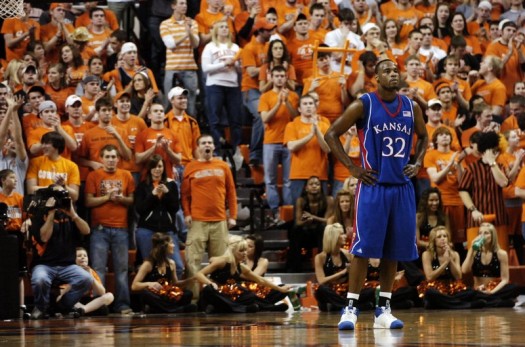 Darnell can't do it alone. Photo: Nick Krug, Lawrence Journal-World.
Darnell can't do it alone. Photo: Nick Krug, Lawrence Journal-World.Contrast the Warriors with the other team that I follow, the Kansas Jayhawks. Where the Warriors are dangerous, inscrutable, fierce competitors who save their best for big games, the Jayhawks have been the opposite: soft, predictable, vulnerable when the game is on the line. Where the Warriors have at least three guys who thrive in pressure situations — Baron, Stack Jack, and Harrington — the Jayhawks have eight guys who could start on any team in America, but not one who wants to take over a game. Last week, I trekked to Oracle with Justin, Mara, and Lynne (Lynne? Blog?), and we watched the Warriors wear down the Celtics and, in the final moments, drive a dagger into their hearts. Three days later, I watched the Jayhawks wilt in the final moments against a very, very fired up Oklahoma State team. Part of the problem is that Kansas simply doesn't have reliable offensive weapons; another part is that teams love beating the Hawks, and each Jayhawk opponent is playing its biggest game of the season. College basketball is different in that regard. Message boards don't rejoice each time the Lakers lose a game, but oh how people love to see teams like Kansas (Google: "kansas" + "choke"), Duke (Google: "duke" + "choke"), and Kentucky (Google: "kentucky" + "choke") lose. Which is fine. If people didn't really react this way, the wins wouldn't be as much fun.The root of the Hawks' problem is offensive, though. The Warriors are stocked with guys who can create their own shot, but Kansas has to rely on Mario Chalmers and Sherron Collins (and, to some extent, Russell Robinson) to break down defenses and spring Brandon Rush on the perimeter or Darrell Arthur inside. Like the Warriors, the Hawks don't run a structured offense with interchangeable parts; they rely on athleticism. This lack of dimension is easily exploited by teams who effectively pressure the Hawks' guards, and who run big guys out to trap the ball at the three-point line. Add to this mix the fact that Kansas guards cannot seem to defend opposing guards, and there's no question that they've got some big problems to solve before mid-March.
A few nights ago, I was watching the Warriors on TNT, when out of the blue appeared a commercial that featured interface design (!!!!). As my man Baron Davis would say: Ya dig?! It was a car ad — for the Lincoln MKZ — and it featured Microsoft Sync, a voice-activated technology for use in the various limos, grandpa-mobiles and ghetto sleds produced by Lincoln. The voice-over assured us that when Microsoft and Lincoln "join forces," "all things are possible." From what I saw, though, the only thing that was clearly possible was the GUI being ugly as hell. Maybe the whole point is the voice-activation, but I'll say this: It better damn well be usable by voice, because it does not appear to be usable by brain and finger.
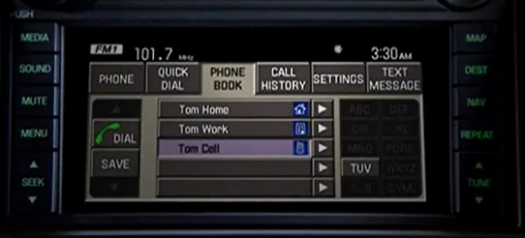 It's true: I haven't actually used Sync yet. So I really shouldn't talk. I'm just disappointed that this interface gets prime time.
It's true: I haven't actually used Sync yet. So I really shouldn't talk. I'm just disappointed that this interface gets prime time.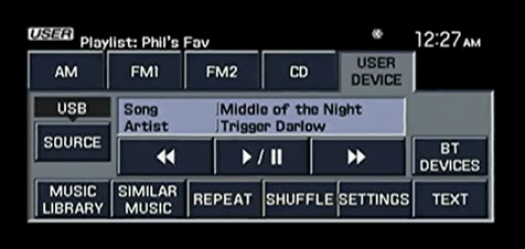 Is it safe to assume that the R&D money was spent on the voice activation part rather than the GUI-specific interaction design part?
Is it safe to assume that the R&D money was spent on the voice activation part rather than the GUI-specific interaction design part? My question: Why would Lincoln feature the GUI in the commercial? Have the people who made the commercial seen the iPhone? What about software interfaces like, say, Office 2007? Do they not realize that there are standards here? Expectations? I guess there's a remote possibility that some marketing consultants found that Lincoln customers have very little overlap with people who desire elegance (related to technology anyway), or that some some stodgy federal body regulates console interfaces (NTSA?), preventing the implementation of elegance in the interface. My suspicion: Lincoln just doesn't know or care about interface design, and that Microsoft bickered internally and churned out the lowest common denominator.(Lastly, I'm not trying to lay on the Windows Hatorade. Every computer I own runs Windows. My phone runs Windows. I'm up to my ears in the stuff.)

